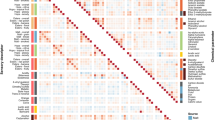Abstract
Objective:
The aim of this study was to determine the impact of demographic, socioeconomic and nutritional determinants on daily versus non-daily sugar-sweetened and artificially sweetened beverage consumption.
Methods:
Cross-sectional design in 1852 military men. Using mailed questionnaires, sugar-sweetened and artificially sweetened beverage consumption was recorded. Principal component analysis was used for dietary pattern analysis.
Results:
Sugar-sweetened and artificially sweetened beverages were consumed daily by 36.3% and 33.2% of the participants, respectively. Age, body mass index (BMI), non-smoking and income were negatively related to sugar-sweetened beverage consumption. High BMI and trying to lose weight were related to artificially sweetened beverages consumption. Three major patterns were obtained from principal component analysis: first, the ‘meat pattern’, was loaded for red meats and processed meats; second, the ‘healthy pattern’, was loaded for tomatoes, fruit, whole grain, vegetables, fruit, fish, tea and nuts; finally, the ‘sweet pattern’ was loaded for sweets, desserts, snacks, high-energy drinks, high-fat dairy products and refined grains. The sugar-sweetened beverage consumption was strongly related with both the meat and sweet dietary patterns and inversely related to the healthy dietary pattern. The artificially sweetened beverage consumption was strongly related with the sweet and healthy dietary pattern.
Conclusions:
Daily consumption of sugar-sweetened beverages was inversely associated with a healthy dietary pattern. Daily consumption of artificially sweetened beverages was clearly associated with weight-loss intention.
This is a preview of subscription content, access via your institution
Access options
Subscribe to this journal
Receive 12 print issues and online access
$259.00 per year
only $21.58 per issue
Buy this article
- Purchase on Springer Link
- Instant access to full article PDF
Prices may be subject to local taxes which are calculated during checkout
Similar content being viewed by others
References
Autier P, Creplet J, Vansant G, Brohet C, Paquot N, Muls E et al. (2003). The impact of reimbursement criteria on the appropriateness of ‘statin’ prescribing. Eur J Cardiovasc Prev Rehabil 10, 462.
Bleich SN, Wang YC, Wang Y, Gortmaker SL (2009). Increasing consumption of sugar-Increasing consumption of sugar-sweetened beverages among US adults: 1988–1994 to 1999–2004. Am J Clin Nutr 89, 988–1994.
Craig CL, Marshall AL, Sostrom M, Bauman AE, Booth ML, Ainsworth BE et al. (2003). International physical activity questionnaire: 12-country reliability and validity. Med Sci Sports Exerc 35, 1381.
Devriese S, Huybrechts I, Moreau M (2004). The Belgian Food Consumption Survey 1–2004. IPH/EPI Reports No 2006-016. Scientific Institute of Public Health: Brussels, Belgium.
Hu FB, Rimm EB, Stampfer MJ, Ascherio A, Spiegelman D, Willett WC (2000). Prospective study of major dietary patterns and risk of coronary heart disease in men. Am J Clin Nutr 72, 912–921.
Ko GT, So W-Y, Chow C, Wong PT, Tong SD, Hui SS et al. (2010). Risk associations of obesity with sugar-sweetened beverages and lifestyle factors in Chinese: the ‘Better Health for Better Hong Kong’ health promotion campaign. Eur J Clin Nutr Dec 64, 1386–1392.
Magnusson RS (2007). Non-communicable diseases and global health governance: enhancing global processes to improve health development. Global Health 22, 3–2.
Malik VS, Schulze MB, Hu FB (2006). Intake of sugar-sweetened beverages and weight gain: a systematic review. Am J Clin Nutr 84, 274–288.
Mullie P, Clarys P, Hulens M, Vansant G (2009a). Reproducibility and validity of a semiquantitative food frequency questionnaire among military men. Mil Med 174, 852–856.
Mullie P, Clarys P, Hulens M, Vansant G (2010a). Distribution of Cardiovascular (DOC-study) risk factors in Belgian army men. Arch Environ Occup Health 65, 135–139.
Mullie P, Guelinckx I, Clarys P, Degrave E, Hulens M, Vansant G (2009b). Cultural, socioeconomic and nutritional determinants of functional food consumption patterns. Eur J Clin Nutr Nov 63, 1290–1296.
Mullie P, Clarys P, Hulens M, Vansant G (2010b). Dietary patterns and socioeconomic position. Eur J Clin Nutr Mar 64, 231–238.
Rehm CD, Matte TD, Van Wye G, Young C, Frieden TR (2008). Demographic and behavioral factors associated with daily sugar-sweetened soda consumption in New York City adults. J Urban Health May 85, 375–385.
Acknowledgements
We are indebted to the participants of this study. We wish to thank Ms Laura-Louise Fairley for the grammatical corrections of the manuscript.
Author information
Authors and Affiliations
Corresponding author
Ethics declarations
Competing interests
The authors declare no conflict of interest.
Additional information
Contributors: PM conceived the original idea together with PC and DA, performed the study, analysed the data and wrote the first draft. All authors contributed to the final draft.
Rights and permissions
About this article
Cite this article
Mullie, P., Aerenhouts, D. & Clarys, P. Demographic, socioeconomic and nutritional determinants of daily versus non-daily sugar-sweetened and artificially sweetened beverage consumption. Eur J Clin Nutr 66, 150–155 (2012). https://doi.org/10.1038/ejcn.2011.138
Received:
Revised:
Accepted:
Published:
Issue Date:
DOI: https://doi.org/10.1038/ejcn.2011.138
Keywords
This article is cited by
-
Factors associated with consumption of sugar-sweetened foods and beverages in Malaysia: an ethnic comparison
International Journal of Diabetes in Developing Countries (2019)
-
Fluid intake of children, adolescents and adults in Indonesia: results of the 2016 Liq.In7 national cross-sectional survey
European Journal of Nutrition (2018)
-
Consumption of soft drinks and health-related quality of life in the adult population
European Journal of Clinical Nutrition (2015)
-
Dietary Patterns and Sugar-Sweetened Beverage Consumption among Adolescents and Adults
Current Nutrition Reports (2014)
-
Beverage consumption habits “24/7” among British adults: association with total water intake and energy intake
Nutrition Journal (2013)



